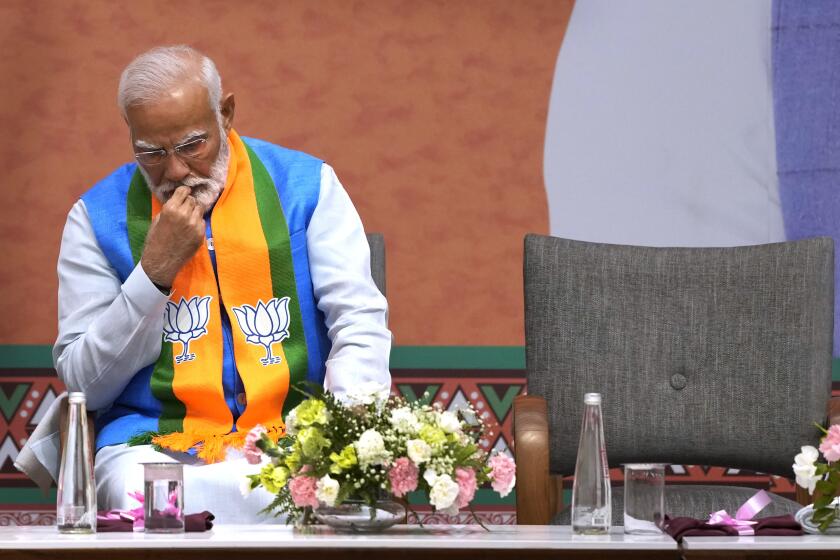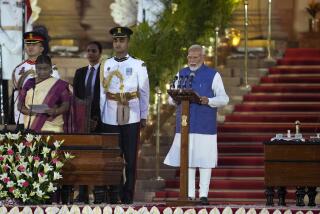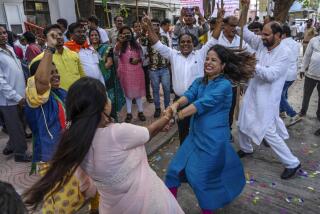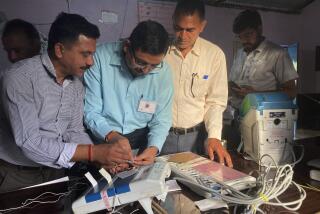Modi loses ground in India’s parliament, but his Hindu nationalist policies are here to stay

- Share via
NEW DELHI — For the first time since Prime Minister Narendra Modi’s Bharatiya Janata Party swept to power in 2014, the party has failed to secure a majority on its own in a national election. But the prime minister’s coalition is still expected to run the country for an additional five years.
Modi’s allies generally support pro-Hindu legislation, but making new policies could be complicated by coalition politics and a slimmer majority.
Despite the setback for Modi, many of the Hindu nationalist policies he’s instituted over the last 10 years remain locked in place.
Here is a look at some of these:
Prime Minister Narendra Modi, one of India’s most beloved and polarizing political leaders, has advanced the cause of Hindu nationalism.
Kashmir’s loss of special status
Soon after winning a second term in 2019, the Modi government stripped the special status of the disputed region of Jammu and Kashmir. Since 1954, the Muslim-majority region had been semiautonomous, with a separate constitution and inherited protections on land and jobs.
The region is now run by unelected government officials and has lost its flag, criminal code and constitution.
The move divided the region into two federal territories, Ladakh and Jammu-Kashmir, both ruled directly by the central government. It was the first downgrade from statehood to a federally administered territory in the history of India.
That decision now seems to be irreversible, with India’s top court upholding the move, ruling in December that the region’s special status had been a “temporary provision.”
The Supreme Court said the government had promised to restore Jammu-Kashmir’s statehood and should do so as soon as possible — but that Ladakh would remain a federal territory. The court also ordered the country’s election commission to hold legislative polls in the region by Sept. 30.
With Prime Minister Narendra Modi’s Hindu nationalist party short of a parliamentary majority, the leader known for unilateral decisions may need to learn a more collaborative style.
A controversial temple on the site of a razed mosque
In January, Modi inaugurated a grand temple to the Hindu god Lord Ram in the northern city of Ayodhya, considered to be the god’s birthplace.
The temple was built on the site of a 16th century mosque that Hindu mobs tore down in 1992, sparking riots in which nearly 2,000 people were killed.
Built at an estimated cost of $217 million and spread over nearly 7.4 acres, the Hindu temple stands on a site that has long been a subject of dispute between the two religions.
The Modi government says the dispute ended in 2019 when India’s Supreme Court called the mosque’s destruction “an egregious violation” of the law, but granted the site to Hindus and gave Muslims a different plot of land.
Hindu hardliners are now eyeing two other mosques that they claim were built on the site of demolished Hindu temples, but a law protects monuments built before the British granted independence to India in 1947, and the opposition is likely to put up a stiff fight if the government seeks to change it.
Indian Prime Minister Narendra Modi and his government are increasingly wielding strong-arm tactics to subdue political opponents and critics.
Citizenship for non-Muslim refugees only
Just weeks before the election, Modi’s government started implementing a 2019 law that extends citizenship to many refugees while barring that right for Muslims.
The law provides a fast track to naturalization for Hindus, Parsis, Sikhs, Buddhists, Jains and Christians who fled to Hindu-majority India from Afghanistan, Bangladesh and Pakistan before Dec. 31, 2014. It excludes Muslims, who are a majority in all three nations.
Opposition-ruled states including West Bengal and Kerala have said they will not implement the law, as they consider it to be discriminatory.
The Modi government started distributing citizenship certificates to non-Muslim migrants in April as the voting started in the national election that ended Saturday.
The law was approved by India’s parliament in 2019, but Modi’s government delayed its implementation after deadly protests broke out in the capital of New Delhi and elsewhere. Scores were killed during days of clashes.
Sharma writes for the Associated Press.













